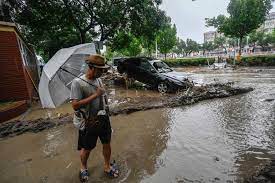At least 20 lives have been tragically lost, and 19 individuals are still reported missing in the wake of torrential rains that struck Beijing and nearby provinces, as disclosed by state media on Tuesday. The downpours have resulted in submerged roads and inundated neighborhoods with mud, creating a dire situation.
The storm, formerly known as super typhoon Doksuri, made its way northwards after causing significant damage in southern Fujian province and impacting the Philippines beforehand.
The heavy rainfall started relentlessly battering the capital and its surrounding areas on Saturday, with an astonishing amount of rain equivalent to nearly the average precipitation for the entire month of July pouring over Beijing in just 40 hours.
Many suburban areas of Beijing are grappling with the aftermath of these intense rains, which rank among the most severe the city has experienced in years. The scale of devastation remains significant, leaving residents struggling to cope with the impacts of this natural disaster.
On the banks of the Mentougou river, an area severely impacted by recent events, AFP reporters witnessed the aftermath of a devastating flood. The road was littered with muddy debris, bearing testimony to the force of nature’s wrath.
One individual bravely shared his account with AFP, recalling that the last time he witnessed such a catastrophic flood was back in July 2012 when it resulted in the tragic loss of 79 lives and the evacuation of tens of thousands. Comparing the two events, he expressed that the current flood far surpasses the magnitude of the one from 2012. However, he chose not to disclose his name, perhaps still overwhelmed by the unfolding situation.
Another eyewitness, a 20-year-old man named Qi, who was waiting for a taxi outside a hospital with his grandmother, described the unfolding events as an uncontrollable natural disaster. His words underscored the helplessness felt by many in the face of such relentless forces of nature.
The situation at the Mentougou river stands as a somber reminder of the unpredictable and often devastating power of nature, leaving the local residents grappling with loss and uncertainty.
On Tuesday, state broadcaster CCTV reported that the heavy rains had tragically claimed the lives of at least 11 people in Beijing. Among the casualties were two workers who lost their lives while bravely carrying out rescue and relief efforts.
Additionally, thirteen individuals were still unaccounted for, while there was some relief as fourteen others were found safe, according to the broadcaster’s update.
In the nearby Hebei province, the rains had caused significant devastation, resulting in the loss of nine lives, with six people remaining missing at the time of the report. The situation called for collective efforts to rebuild and offer support to those affected.
It is evident that we still have much work ahead of us to overcome the aftermath of this natural disaster. Together, we must persevere and work diligently to rebuild the affected areas and provide aid to those in need.
Over the weekend, northeastern Liaoning province reported two additional casualties due to heavy rains.
On Tuesday, President Xi Jinping urgently called for “every effort” to rescue those who are “lost or trapped” in the affected areas.
The state-owned Global Times newspaper reported that more than 100,000 people in Beijing, deemed at risk, have been successfully evacuated.
To support disaster relief efforts in the capital and surrounding provinces, authorities have allocated 110 million yuan ($15.4 million), as stated by CCTV.
Florist Wang Yongkun, 62, had taken precautionary measures by piling sandbags around the door of his shop, but unfortunately, the floor inside was still covered in mud. Despite having worked at the shop for 15 years, he had never encountered such a situation in the last few days.
“We started cleaning up yesterday afternoon and had to resume at seven in the morning today,” he explained.
Despite the challenges, Wang remained resilient, stating, “You just have to deal with it… We will endure what we can.”
Further south in Fangshan district, the situation was equally dire. The Dashi River had overflowed, leading to partial submergence of trees along the riverbank, and some sections of the road had to be cordoned off.
The roads were caked in mud, foliage, and various debris, including an upturned armchair. AFP reporters witnessed collapsed bridges in two locations, and locals reported that the damage had occurred during the recent heavy rains.
Social media videos tagged in Fangshan previously showed multiple cars being swept along roads turned into fast-flowing streams.
On Tuesday morning, live images from broadcaster CCTV depicted a row of buses half-submerged in floodwater. In the parking lot of a high-rise apartment complex, cars were piled on top of each other, their alarms still sounding. People stood in lines with buckets and containers to collect fresh water, highlighting the severity of the flooding’s impact on daily life.
Local media on Monday published footage of chaotic scenes aboard high-speed rail trains stranded on tracks for as long as 30 hours, with passengers complaining that they had run out of essential supplies like food and water.
In response to the situation, President Xi emphasized the need to properly relocate affected people and swiftly repair damaged transportation, communication, and electricity infrastructure. He urged authorities to restore normal production and life as soon as possible.
The capital city activated a flood control reservoir on Monday for the first time since its construction in 1998, as reported by the Beijing Daily.
Several parts of Hebei remain under red alert for rainstorms, with authorities warning about the potential for flash floods and landslides.
One example of the dire situation was in Handan, Hebei province, where rescuers successfully reached a man trapped on top of his car in floodwaters using a crane. They managed to lift him to safety just before the car was flipped and washed away by the current.
China has been grappling with extreme weather and recording record temperatures this summer, with scientists attributing these events to the exacerbating effects of climate change.
In addition to the ongoing challenges, the country is bracing itself for the arrival of typhoon Khanun, the sixth such storm of the year, as it approaches China’s east coast.




